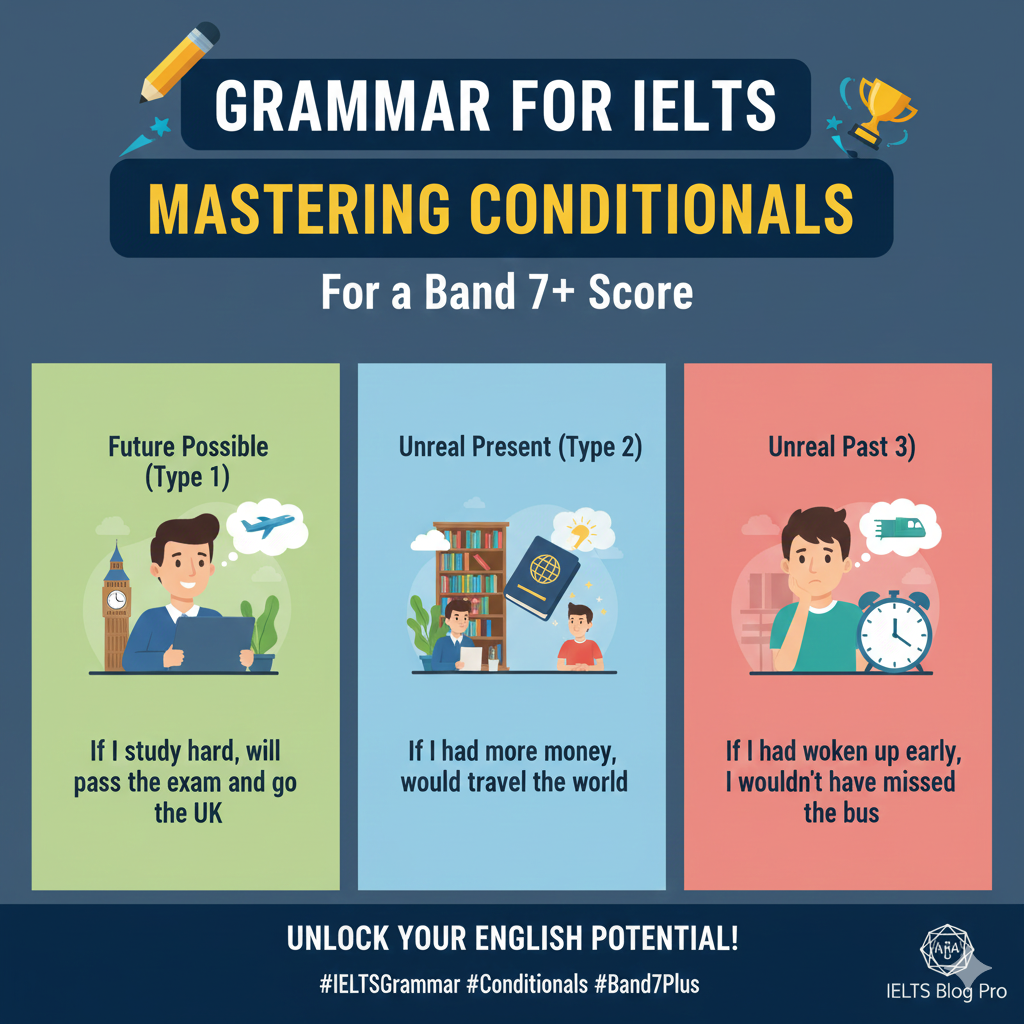
Do you sometimes hesitate before an “if” sentence? You’re not alone. Conditionals are a cornerstone of advanced English grammar and a key tool for IELTS examiners to assess your grammatical range and accuracy. Using them correctly doesn’t just prevent mistakes; it allows you to express complex, hypothetical, and reflective ideas—exactly what you need for a Band 7+.
This guide goes beyond the basic rules. We’ll explore how to use conditionals naturally in your IELTS Speaking and Writing to sound more fluent and persuasive.
Why Conditionals are IELTS Gold
Think about these common IELTS tasks:
- Writing Task 2: “What are the consequences if a country neglects its environmental policies?” (This requires a Second Conditional)
- Speaking Part 3: “How might education change in the future?” (This is a perfect setup for a Mixed Conditional)
Using conditionals correctly shows you can discuss possibilities, consequences, and hypothetical scenarios with sophistication.
The Four Main Conditionals: Structure, Use, and IELTS Application
1. Zero Conditional: The Universal Truth
- Structure:
If/When + Present Simple, Present Simple - Function: To express scientific facts, general truths, and inevitable results.
- IELTS Context: Perfect for Writing Task 1 (describing a process) or Speaking Part 1 when stating facts.
- Daily Life Examples:
- “If you heat ice, it melts.”
- “When governments invest in public transport, traffic congestion decreases.”
- (Writing Task 1 – Process) “If the raw material passes the quality check, it is sent for processing.”
2. First Conditional: The Real Future Possibility
- Structure:
If + Present Simple, will + base verb - Function: To talk about a specific, likely or possible outcome in the future.
- IELTS Context: Ideal for making predictions in Writing Task 1 (graphs) or discussing future plans in Speaking Part 2.
- Advanced Daily Life Examples:
- “If the economic growth rate continues at this pace, we will see a significant rise in living standards.”
- “If I get a Band 8 on the IELTS, I will apply to universities in the UK immediately.”
- “Unless we take action now, climate change will become irreversible.” (Unless means if not).
3. Second Conditional: The Unreal Present or Improbable Future
- Structure:
If + Past Simple, would/could/might + base verb - Function: To talk about…
- a) Hypothetical, imaginary, or unlikely situations in the present or future.
- b) Unrealistic wishes or advice.
- IELTS Context: Crucial for Writing Task 2 essays that ask for opinions on abstract topics (e.g., ideal societies, impossible changes) and Speaking Part 3 discussions.
- Advanced Daily Life Examples:
- “If I were the mayor of my city, I would invest heavily in renewable energy sources.” (Imaginary present situation)
- “If everyone spoke a common global language, international business would be much more efficient.” (Improbable future)
- “I would definitely move abroad if I could find a job in my field there.” (Unrealistic wish)
4. Third Conditional: The Regretful Past
- Structure:
If + Past Perfect, would have + past participle - Function: To hypothesize about the past and imagine how it could have been different. Often used to express regret or critique past actions.
- IELTS Context: Excellent for a high-level conclusion in Writing Task 2 or reflecting on past events in Speaking Part 2.
- Advanced Daily Life Examples:
- “If the government had implemented stricter policies earlier, the environmental crisis would not have become so severe.” (Critiquing a past action)
- “I would have chosen a different major at university if I had known more about the job market.” (Expressing regret)
- “The company would not have gone bankrupt if it had adapted to digital trends.” (Analyzing a past mistake)
Bonus: Mixed Conditionals – The Band 9 Tool
- Structure: Typically combines a Third Conditional clause with a Second Conditional clause (or vice versa).
- Function: To show how a past action affects the present, or a present state affected a past action.
- IELTS Context: This is advanced grammar that demonstrates true mastery and flexibility, impressing examiners in Speaking and Writing.
- Advanced Daily Life Examples:
- “If I had studied linguistics (Past -> 3rd), I would be fluent in several languages now (Present -> 2nd).”
- “She wouldn’t be so knowledgeable about politics now if she hadn’t read the newspaper every day as a child.”
Practice Exercises
Exercise 1:
Identify the type of conditional (0, 1st, 2nd, 3rd, Mixed) in these sentences.
Exercise 2:
Complete these sentences appropriately for an IELTS context.
Exercise 3:
Rephrase these sentences using a conditional structure.
Final Tips for IELTS Success
- Don’t Overdo It: Use conditionals naturally where the context calls for them. Forcing them in will sound unnatural.
- Accuracy Over Complexity: A correct First Conditional is better than an incorrect Third Conditional. Master the form.
- Practice Speaking: Record yourself answering IELTS questions and listen for opportunities to use conditionals naturally.
Struggling to use these structures fluently under exam pressure? Our expert IELTS tutors can give you personalized feedback on your grammar and help you build confidence.

